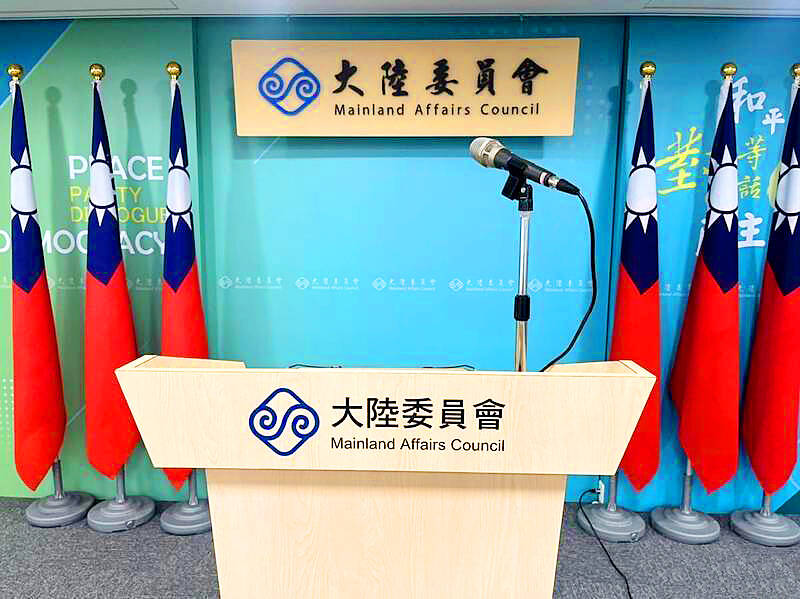The Mainland Affairs Council (MAC) yesterday vowed to investigate claims made in a YouTube video about China’s efforts to politically influence young Taiwanese and encourage them to apply for Chinese ID cards.
The council’s comments follow Saturday’s release of a video by Taiwanese rapper Chen Po-yuan (陳柏源) and YouTuber “Pa Chiung (八炯)” on China’s “united front” tactics. It is the second video on the subject the pair have released this month.
In the video, Chen visits the Taiwan Youth Entrepreneurship Park in Quanzhou in China’s Fujian Province and the Strait Herald news platform in Xiamen, China.

Photo: Taipei Times
The Strait Herald — owned by newspaper publisher Fujian Daily News, which is affiliated with the Fujian Provincial Committee of the Chinese Communist Party (CCP) — primarily focuses on issues related to Taiwan.
Strait Herald assistant director Lin Jingdong (林靖東), who is a member of the CCP, discussed in the video strategies used to influence young Taiwanese as a part of China’s “united front” tactics.
The tactics include “incubating” young Taiwanese through Taiwan-related organizations and collaborating with many small-scale influencers.
When Chen asked her about potentially running for public office, Lin said he should consider aligning with the New Party or the China Unification Promotion Party, but if he requires “organized” votes, he should align with the Chinese Nationalist Party (KMT).
Chen also spoke with the head of the entrepreneurship park, Lin Jincheng (林金城), who said that within a month Chen could apply for a Chinese ID card, register a company in China and start a cross-border e-commerce business.
With a Chinese ID card, Chen could acquire property and vehicles in China without a down payment and use them as collateral to apply for bank loans, Lin Jincheng said in the video.
Due to Taiwan’s political situation, any Taiwanese who is a “compatriot” can apply for a Chinese ID card, they said.
The video said that about 2,000 Taiwanese living in Xiamen have Chinese ID cards and 4,000 Taiwanese are applying for household registration in the city.
More than 100,000 Taiwanese already have Chinese ID cards, and the number of total applicants has reached 200,000, the video said.
The video also said that some young Taiwanese “entrepreneurs” overborrow from banks, and then split the money with intermediaries and CCP officials before transferring the rest back to Taiwan.
The MAC said that the CCP offers benefits to Taiwanese under the guise of “cross-strait exchange,” in an effort to divide the nation and undermine its stability.
Under Article 9 of the Act Governing the Relations Between the People of Taiwan and the Mainland Area (臺灣地區與大陸地區人民關係條例), “people of the Taiwan Area may not have household registrations in the Mainland Area or hold passports issued by the Mainland Area.”
Contraveners could have their Taiwanese household registration and citizenship revoked, and lose their right to participate in elections, recalls and referendums, serve in the military, and hold public office, it said.
Additional reporting by Chen Yu-fu

A magnitude 5.6 earthquake struck off the coast of Yilan County at 12:37pm today, with clear shaking felt across much of northern Taiwan. There were no immediate reports of damage. The epicenter of the quake was 16.9km east-southeast of Yilan County Hall offshore at a depth of 66.8km, Central Weather Administration (CWA) data showed. The maximum intensity registered at a 4 in Yilan County’s Nanao Township (南澳) on Taiwan’s seven-tier scale. Other parts of Yilan, as well as certain areas of Hualien County, Taipei, New Taipei City, Taoyuan, Hsinchu County, Taichung and Miaoli County, recorded intensities of 3. Residents of Yilan County and Taipei received

Taiwan has secured another breakthrough in fruit exports, with jujubes, dragon fruit and lychees approved for shipment to the EU, the Ministry of Agriculture said yesterday. The Animal and Plant Health Inspection Agency on Thursday received formal notification of the approval from the EU, the ministry said, adding that the decision was expected to expand Taiwanese fruit producers’ access to high-end European markets. Taiwan exported 126 tonnes of lychees last year, valued at US$1.48 million, with Japan accounting for 102 tonnes. Other export destinations included New Zealand, Hong Kong, the US and Australia, ministry data showed. Jujube exports totaled 103 tonnes, valued at

BIG SPENDERS: Foreign investors bought the most Taiwan equities since 2005, signaling confidence that an AI boom would continue to benefit chipmakers Taiwan Semiconductor Manufacturing Co’s (TSMC, 台積電) market capitalization swelled to US$2 trillion for the first time following a 4.25 percent rally in its American depositary receipts (ADR) overnight, putting the world’s biggest contract chipmaker sixth on the list of the world’s biggest companies by market capitalization, just behind Amazon.com Inc. The site CompaniesMarketcap.com ranked TSMC ahead of Saudi Aramco and Meta Platforms Inc. The Taiwanese company’s ADRs on Tuesday surged to US$385.75 on the New York Stock Exchange, as strong demand for artificial intelligence (AI) applications led to chip supply constraints and boost revenue growth to record-breaking levels. Each TSMC ADR represents

TRUST: The KMT said it respected the US’ timing and considerations, and hoped it would continue to honor its commitments to helping Taiwan bolster its defenses and deterrence US President Donald Trump is delaying a multibillion-dollar arms sale to Taiwan to ensure his visit to Beijing is successful, a New York Times report said. The weapons sales package has stalled in the US Department of State, the report said, citing US officials it did not identify. The White House has told agencies not to push forward ahead of Trump’s meeting with Chinese President Xi Jinping (習近平), it said. The two last month held a phone call to discuss trade and geopolitical flashpoints ahead of the summit. Xi raised the Taiwan issue and urged the US to handle arms sales to